|
|
|
Sort Order |
|
|
|
Items / Page
|
|
|
|
|
|
|
| Srl | Item |
| 1 |
ID:
056720
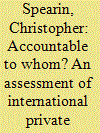

|
|
|
| 2 |
ID:
100945
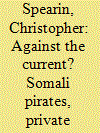

|
|
|
|
|
| Publication |
2010.
|
| Summary/Abstract |
The American call for commercial shippers to rely upon private security companies (PSCs) to protect their vessels from Somali pirates presents several challenges to sea users. Though this call for responsibilization inherently reveals state limitations, not all commercial shippers embrace it because it upsets traditional conceptions regarding order at sea. Also, the call's American origins suggest that the United States Navy may not work to ensure freedom of navigation in the last resort despite longstanding practice and the expectations of sea users. This, in turn, underscores the lack of structure in relations amongst states, shippers, and PSCs, which could have detrimental consequences regarding the management of violence at sea. The United States Navy may cease working to ensure freedom of navigation in the last resort despite longstanding practice and the expectations. While greater utilization of PSCs might seem to be an effective alternative and European states might add substance to the American call, perhaps through the Montreux Document, European activism is likely to be tempered by the different approaches towards private security that vary from country to country. PSC activism may affect the ability of navies to perform roles beyond the protection of commercial shipping.
|
|
|
|
|
|
|
|
|
|
|
|
|
|
|
|
| 3 |
ID:
052469
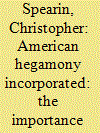

|
|
|
|
|
| Publication |
Dec 2003.
|
| Summary/Abstract |
The article contends that private military contractors supporting American military operations in Iraq will come under intense international scrutiny. Various factors have led to the substantial private presence and the Iraq case reveals shifts in international dynamics from state to private actors. However, the private presence raises concerns that will have to be considered due to the fishbowl qualities of the Iraq case. How the state-contractor relationship is managed will likely have a significant impact upon American policy in Iraq and upon how American military might is perceived, produced, and applied in the future.
Indeed, there are many problems and it is not entirely clear that the United States is prepared to handle the effects stemming from its heavy reliance upon military contractors.
|
|
|
|
|
|
|
|
|
|
|
|
|
|
|
|
| 4 |
ID:
094610
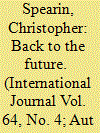

|
|
|
| 5 |
ID:
061874
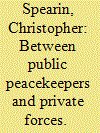

|
|
|
| 6 |
ID:
136445
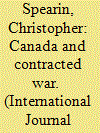

|
|
|
|
|
| Summary/Abstract |
It is important to recognize the multifaceted, and sometimes necessary, role military and security contracting played in supporting the Canadian Armed Forces (CAF) in Afghanistan. It is also important to assess the degree to which this expeditionary experience might shape later Canadian engagement with the private sector. To do so, the paper first identifies the four key areas of CAF military and security contracting pertaining to the mission in Afghanistan: logistics and support personnel, equipment, training, and defensive security. Regarding this last form of contracting, the paper then focuses on Canadian engagement in the development of the Montreux Document and the subsequent creation of the draft National Defence Directive on the Selection and Use of Private Military and Security Contractors on Deployed Operations. Unlike other endeavours, this activism explicitly recognized Canadian reliance on contractors and the need to manage the risk associated with contracting. The paper’s final section suggests the manner in which the directive will shape future contracting decisions, especially given the growing connections between contracting for logistics, training, and defensive security.
|
|
|
|
|
|
|
|
|
|
|
|
|
|
|
|
| 7 |
ID:
090762
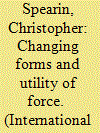

|
|
|
|
|
| Publication |
2009.
|
| Summary/Abstract |
This article's goal is to cast a net wider to consider how the private security industry may affect with Canadian forces position as Canada's official organisation charged with the responsibility to employ violence when needed overseas. The article's objective is to examine how Canada presently relies upon private security companies and why this reliance has come about.
|
|
|
|
|
|
|
|
|
|
|
|
|
|
|
|
| 8 |
ID:
136440
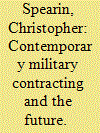

|
|
|
|
|
| Summary/Abstract |
Since the start of the twenty-first century, military contractors such as Blackwater (now named Academi), Kellogg, Brown & Root, and SNC Lavalin have become household names in many countries. The reasons for their prominence vary from case to case. One is notoriety. Particular firms hold contracts valued in the millions if not billions of dollars, and the conduct of some firms has not been beyond reproach in terms of military effectiveness or their observance of human rights. A second reason is reliance. Contractors are needed to keep state military personnel fed and supplied, to maintain their machines, and in some cases even to protect them. Developed world states especially require them for warring, training, and simply operating given the limited numbers of available national military personnel, the increasing sophistication of military technologies, and the political ramifications of applying state forces overseas. In many states, contractors have therefore become part of the total national force. Yet another reason pertains to dedication and sacrifice. Many firms suffered significant levels of casualties during the long-term interventions in Iraq and Afghanistan. Thousands of contracted personnel have provided continuity over the long haul in often austere and intemperate conditions. All of this points to the considerable depth and scope of contractor involvement, arguably unprecedented in recent decades if not centuries. It also stands at odds with traditional conceptions of expensive state security sectors and their capabilities and responsibilities to manage and apply violence.
|
|
|
|
|
|
|
|
|
|
|
|
|
|
|
|
| 9 |
ID:
082136
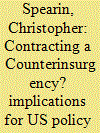

|
|
|
|
|
| Publication |
2007.
|
| Summary/Abstract |
Washington's growing reliance upon international private security companies (PSCs) will lead to these firms becoming prominent vehicles in the prosecution of the counterinsurgency in Iraq. This shift, however, risks labeling PSCs as mercenaries and presents considerable challenges regarding the control of non-state violence. Moreover, tradeoffs exist regarding the different nationalities of PSC personnel. Utilization of personnel from the developed world risks compromising the capabilities of Special Operations Forces. Additionally, shifts in casualty recognition amongst US policymakers and the media suggest that the private option is becoming politically salient and thus less useful. Many developing world states are increasingly concerned about how the global outsourcing of security sector expertise risks their stability and ability to execute coherent policy. Finally, the employment of Iraqis in PSCs sends mixed messages to the Iraqi populace about the need for and the effectiveness of a cohesive and responsible indigenous security sector.
|
|
|
|
|
|
|
|
|
|
|
|
|
|
|
|
| 10 |
ID:
161303
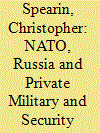

|
|
|
|
|
| Summary/Abstract |
In this article, Christopher Spearin examines Russian private military and security companies (PMSCs) operating in the so-called ‘grey zone’ and highlights their offensive character. Regarding a potential NATO response, the article contends that advancing an international normative stance such that PMSC employment should be viewed in an undeniable and defensive manner would be a positive approach.
|
|
|
|
|
|
|
|
|
|
|
|
|
|
|
|
| 11 |
ID:
069365
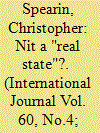

|
|
|
| 12 |
ID:
100666
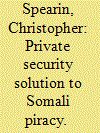

|
|
|
| 13 |
ID:
083434
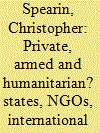

|
|
|
|
|
| Publication |
2008.
|
| Summary/Abstract |
The article contends that, in the light of contemporary challenges, states are not only changing the meaning of the word `humanitarian', but are also creating an expanding marketplace that includes international private security companies (PSCs) in the delivery of humanitarian assistance. Three types of factors - supply, demand, and ideational - have led to this development. On the supply side, state-demanded limitations on the private employment of violence and reduced commercial opportunities in Iraq have called for PSC diversification. On the demand side, states increasingly wish for non-state partners that are comfortable with their involvement in integrated solutions, something that PSCs, rather than nongovernmental organizations (NGOs), are more willing to embrace. On the ideational side, NGOs are concerned that humanitarian endeavour is losing its neutral and impartial status in order to facilitate counterinsurgency, `hearts and minds' activities. PSCs, in contrast, are content with the partial delivery of assistance and likely will continue to be so given, in large part, the experiences of their personnel.
|
|
|
|
|
|
|
|
|
|
|
|
|
|
|
|
| 14 |
ID:
159850
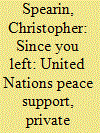

|
|
|
|
|
| Summary/Abstract |
In the late 1990s when Canada was largely removing itself from United Nations peace support endeavours, private military and security companies were heralded as likely replacements. Canada has indicated its desire to reengage in a United Nations peace support milieu in which there is now a private military and security presence. It is not the type of presence initially envisioned, but it is one with multiple impacts regarding training and operations. This article emphasizes the interventions in the first decade of the twenty-first century and the corresponding, defensively minded regulations that came about in the private military and security industry. The article reveals that commercial logics are now insinuated in United Nations peace support operations and the private military and security presence therein is indicative of a larger shift in United Nations activities towards insularity and protection.
|
|
|
|
|
|
|
|
|
|
|
|
|
|
|
|
| 15 |
ID:
193514
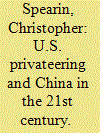

|
|
|
|
|
| Summary/Abstract |
Given calls for the United States to launch privateers against China, the article contends that such an effort would be unsuccessful for two reasons. First, the contemporary private military and security industry – the focal point of present calls – is not attuned to privateering. This is because of the following: its defensive posture; quantitative and qualitative issues related to maritime vessels; its non-U.S. ownership; concerns about innocent passage; and the nature of its expertise. Second, the article contends that despite legal uncertainty regarding privateering, the necessary international relationships for privateering to function are not in place.
|
|
|
|
|
|
|
|
|
|
|
|
|
|
|
|
| 16 |
ID:
184083
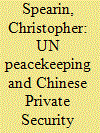

|
|
|
|
|
| Summary/Abstract |
Using China’s UN peacekeeping as a foil, the article explores the demand factors that inform the usage of Chinese Private Security Companies (PSCs) to protect Chinese economic interests and nationals abroad. The article makes three assertions. First, compared to Chinese peacekeepers, PSCs can offer a more focused and responsive presence overseas, a presence that is increasingly demanded by the Chinese leadership and citizenry. Second, Chinese PSCs can provide a less prominent footprint for when Chinese agendas and approaches, despite the desire to maintain a policy of non-interference, inevitably clash with local political dynamics and actors. Third, when considering Chinese peacekeepers that increasingly face the pressure to apply lethal violence, Chinese policy regarding the PSC employment of firearms constrains more robust PSC responses to security challenges that might further inflame sensitive matters regarding non-interference.
|
|
|
|
|
|
|
|
|
|
|
|
|
|
|
|
| 17 |
ID:
103221
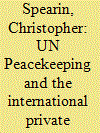

|
|
|
|
|
| Publication |
2011.
|
| Summary/Abstract |
UN peacekeeping continues to confront qualitative and quantitative difficulties. Arguments in favour of using private military and security companies (PMSCs), particularly those referring to the 1990s-era when Executive Outcomes was operating, have been aired. The article examines earlier operational arguments for PMSC participation in UN peacekeeping, which at times have been reintroduced in more recent assertions: (1) PMSCs have better organization, training, and equipment; (2) they have a heightened willingness to apply force to serve UN mandates; and (3) they enjoy enhanced readiness to respond. The article argues, however, that it would be difficult for contemporary PMSCs to respond effectively, quickly, and robustly should the UN turn to them for enforcement operations. State and market pressures have conditioned PMSCs to operate in a manner dissimilar to that in the 1990s.
|
|
|
|
|
|
|
|
|
|
|
|
|
|
|
|
| 18 |
ID:
133072
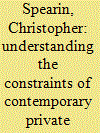

|
|
|
|
|
| Publication |
2014.
|
| Summary/Abstract |
For the secretary-general of the United Nations, Ban Ki-moon, contemporary piracy is nothing less than a "global menace." There are several piracy "hot spots" the world over, each with its own dynamics, but it is Somali piracy that in recent years has particularly caught the attention and raised the ire of states, shippers, and international organizations. International Maritime Organization (IMO) statistics reflect the quantitative dominance of Somali piracy. In 2010 and 2011, the number of alleged attacks in international waters off East Africa and on the Indian Ocean (into which Somali pirates now venture) was 84 percent of the global totals in each year. In 2012, owing to developments both on land and at sea, the Somali weighting declined, but it was still a considerable 54 percent of global totals.
|
|
|
|
|
|
|
|
|
|
|
|
|
|
|
|
|
|
|
|
|